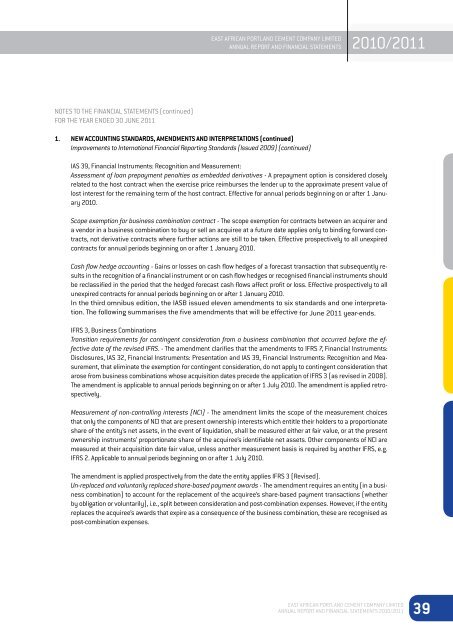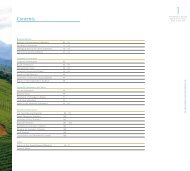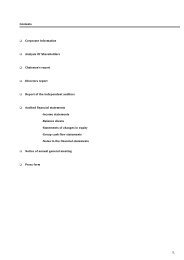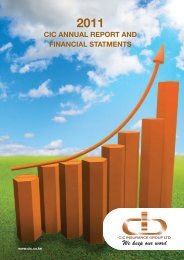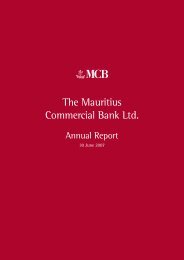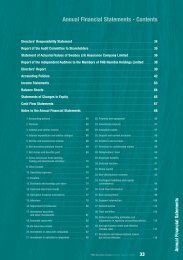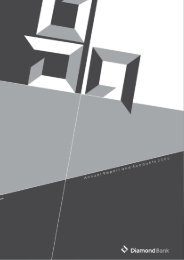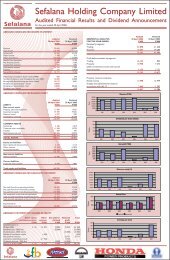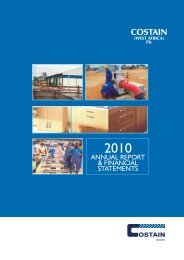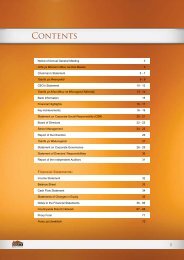EAPCC_Annual_Report_.. - Investing In Africa
EAPCC_Annual_Report_.. - Investing In Africa
EAPCC_Annual_Report_.. - Investing In Africa
You also want an ePaper? Increase the reach of your titles
YUMPU automatically turns print PDFs into web optimized ePapers that Google loves.
EAST AFRICAN PORTLAND CEMENT COMPANY LIMITED<br />
ANNUAL REPORT AND FINANCIAL STATEMENTS<br />
2010/2011<br />
NOTES TO THE FINANCIAL STATEMENTS (continued)<br />
FOR THE YEAR ENDED 30 JUNE 2011<br />
1.<br />
NEW ACCOUNTING STANDARDS, AMENDMENTS AND INTERPRETATIONS (continued)<br />
Improvements to <strong>In</strong>ternational Financial <strong>Report</strong>ing Standards (Issued 2009) (continued)<br />
IAS 39, Financial <strong>In</strong>struments: Recognition and Measurement:<br />
Assessment of loan prepayment penalties as embedded derivatives - A prepayment option is considered closely<br />
related to the host contract when the exercise price reimburses the lender up to the approximate present value of<br />
lost interest for the remaining term of the host contract. Effective for annual periods beginning on or after 1 January<br />
2010.<br />
Scope exemption for business combination contract - The scope exemption for contracts between an acquirer and<br />
a vendor in a business combination to buy or sell an acquiree at a future date applies only to binding forward contracts,<br />
not derivative contracts where further actions are still to be taken. Effective prospectively to all unexpired<br />
contracts for annual periods beginning on or after 1 January 2010.<br />
Cash flow hedge accounting - Gains or losses on cash flow hedges of a forecast transaction that subsequently results<br />
in the recognition of a financial instrument or on cash flow hedges or recognised financial instruments should<br />
be reclassified in the period that the hedged forecast cash flows affect profit or loss. Effective prospectively to all<br />
unexpired contracts for annual periods beginning on or after 1 January 2010.<br />
<strong>In</strong> the third omnibus edition, the IASB issued eleven amendments to six standards and one interpretation.<br />
The following summarises the five amendments that will be effective for June 2011 year-ends.<br />
IFRS 3, Business Combinations<br />
Transition requirements for contingent consideration from a business combination that occurred before the effective<br />
date of the revised IFRS. - The amendment clarifies that the amendments to IFRS 7, Financial <strong>In</strong>struments:<br />
Disclosures, IAS 32, Financial <strong>In</strong>struments: Presentation and IAS 39, Financial <strong>In</strong>struments: Recognition and Measurement,<br />
that eliminate the exemption for contingent consideration, do not apply to contingent consideration that<br />
arose from business combinations whose acquisition dates precede the application of IFRS 3 (as revised in 2008).<br />
The amendment is applicable to annual periods beginning on or after 1 July 2010. The amendment is applied retrospectively.<br />
Measurement of non-controlling interests (NCI) - The amendment limits the scope of the measurement choices<br />
that only the components of NCI that are present ownership interests which entitle their holders to a proportionate<br />
share of the entity’s net assets, in the event of liquidation, shall be measured either at fair value, or at the present<br />
ownership instruments’ proportionate share of the acquiree’s identifiable net assets. Other components of NCI are<br />
measured at their acquisition date fair value, unless another measurement basis is required by another IFRS, e.g.<br />
IFRS 2. Applicable to annual periods beginning on or after 1 July 2010.<br />
The amendment is applied prospectively from the date the entity applies IFRS 3 (Revised).<br />
Un-replaced and voluntarily replaced share-based payment awards - The amendment requires an entity (in a business<br />
combination) to account for the replacement of the acquiree’s share-based payment transactions (whether<br />
by obligation or voluntarily), i.e., split between consideration and post-combination expenses. However, if the entity<br />
replaces the acquiree’s awards that expire as a consequence of the business combination, these are recognised as<br />
post-combination expenses.<br />
EAST AFRICAN PORTLAND CEMENT COMPANY LIMITED<br />
ANNUAL REPORT AND FINANCIAL STATEMENTS 2010/2011 39


